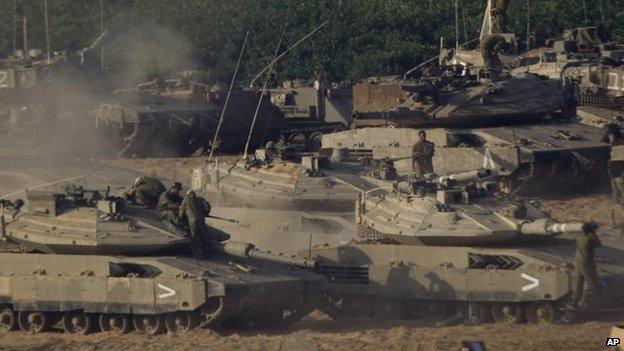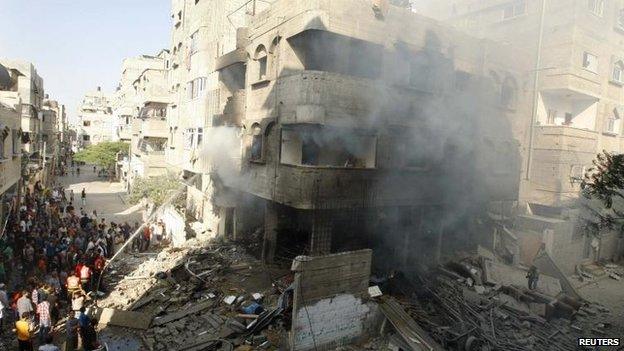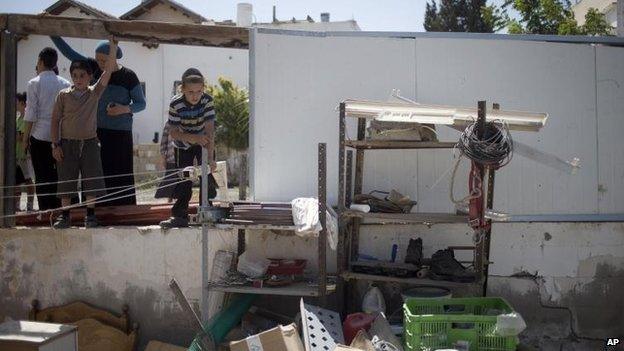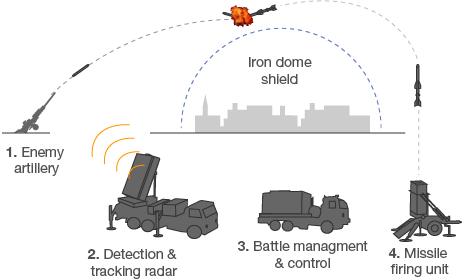Deaths rise in Israeli air strikes on Gaza
- Published
Yolande Knell in Gaza says civilians are "extremely afraid"
More than 20 people have been killed in the latest air raids on Gaza, Palestinian officials say, as Israel continues its current offensive.
The Palestinian health ministry said most died in attacks on a house and a cafe in Khan Younis in the south, bringing the overall death toll to 80.
Militants in Gaza continued firing rockets into Israel on Thursday, with sirens sounding over southern towns.
UN Secretary General Ban Ki-moon warned the situation was "on a knife-edge".
Israel launched its operation on Tuesday, after a surge in rocket-fire amid a crackdown on Hamas members in the West Bank last month, as Israel hunted for the abductors of three Israeli teenagers.
The teenagers were found murdered, and tensions were raised further with the killing of a Palestinian teenager in a suspected revenge attack days later.
'Tap on roof'
The Israeli military said that it had attacked 108 targets since midnight and that 12 rockets had been fired at Israel, seven of them intercepted by the Iron Dome defence system.
James Reynolds reporting from the Kfar Aza kibbutz where the community has been "shaken" by rocket attacks
Israel says its targets in Operation Protective Edge have been militant fighters and facilities including rocket launchers, weapons stores, tunnels and command centres.
The Palestinian health ministry said 17 people including five children and three women were killed in the strikes on the house and cafe in Khan Younis.
Israel has not commented on the incidents.

At the scene: BBC's Yolande Knell in Gaza
On a normal day, the streets of Gaza City are teeming with people and cars honk their horns as they sit in traffic jams. Now they are eerily quiet. Occasionally someone strides past purposefully, or a car or ambulance races by. The shops are all shuttered.
Most people here are staying at home trying to keep safe. Some will also be catching up on sleep after a noisy night when Israeli naval ships bombarded this coastal strip, making buildings shake and babies cry.
Local television stations can hardly keep up with the pace of news from inside busy hospitals and outside demolished homes. They show shocking images of dead children being pulled from the rubble on repeat.
The increasing number of civilians killed is alarming. Some people have moved in with other family members who they deem to live in safer areas. Egypt has opened its border crossing with Gaza for casualties but otherwise there is no way to leave the Palestinian territory because of the Egyptian and Israeli blockade.

At the scene: BBC's James Reynolds on Israel's Gaza border
Shortly before 0300 ( midnight GMT) in Ashkelon, a rocket siren sounded. I woke and headed to the secure room of our hotel (joined by guests in their pyjamas). There was no all-clear siren so, after a minute or two, we guessed that the threat from the rocket had passed, and headed back to our rooms.
This morning, near the border with Gaza, my colleagues and I saw a column of black smoke in a field - a fire caused by a rocket attack. Farmers drove tractors over the flames to put out the fire.
We drove on and saw Gaza itself, a few miles away, on the horizon. We saw three jet plumes of white smoke shoot up from Gaza - rockets being fired from the Palestinian territory.

Elsewhere on Thursday:
Three people died in an Israeli air strike on a car in the west of Gaza City, Palestinian media reports said. Reuters said the victims were militants from Islamic Jihad
Three people were killed in an air strike targeting a Hamas activist in the northern town of Beit Lahiya, Palestinian officials said
The Palestinian health ministry said that in addition to the dead, some 540 people had been injured overall
Ban Ki-moon: "The lives of countless innocent civilians and the peace process itself are in the balance"
Israel says militants have fired more than 365 rockets from Gaza since Tuesday and that it has attacked about 780 targets over the same time.
The armed wing of Hamas said it had fired two M75 rockets at Tel Aviv. Israel said Iron Dome had intercepted one.

It also said three rockets had hit civilian communities in the southern Negev desert and several others struck the Netivot area.
Meanwhile, an Israeli military spokesman said an attack on a house in Khan Younis on Tuesday in which eight people were killed was "a tragedy - not what we intended", adding people had returned to the building too soon following a telephone warning.
The home was said to be that of Odeh Kaware, a local Hamas commander.
Israeli sources say a second warning was given when a projectile without a warhead was fired at the building in a tactic known as a "tap on the roof", but people went back.
"They were told to leave, they returned, and the missile was already on the way. It was too late," the Jerusalem Post newspaper quoted an Israeli security source as saying.
The Palestinian Maan news agency said dozens of people had gathered on the roof, external after the family had been warned by Israel that the building would be targeted.

Israeli leaders say a ground offensive might happen "quite soon"

The site of an Israeli strike in Gaza City
Egypt's role
Separately, Egyptian state television said the government had decided to open the Rafah border crossing on Thursday to evacuate some of those wounded in the Israeli attacks.
Hospitals in North Sinai have been placed on standby and 30 ambulances sent to the crossing.
Egypt says it is in contact with both sides. But while it has played a key role in the past as a mediator, it currently appears to be biding its time, says the BBC's Orla Guerin in Cairo.
Analysts say Egypt is in no hurry to broker a ceasefire that might benefit Hamas - as happened under ousted Islamist President Mohammed Morsi in November 2012.
Egypt sees Hamas, an offshoot of Mr Morsi's Muslim Brotherhood, as a direct threat.
Having crushed the Brotherhood over the past year, it wants to see Hamas suffer the same fate, our correspondent says. In that sense, it is on the same page with Israel, she adds.
Emergency talks
Overnight Mr Ban warned of the dangers of escalation, saying the region "cannot afford another full-blown war".
"The deteriorating situation is leading to a downward spiral which could quickly get out of control," Mr Ban said. "The risk of violence expanding further still is real."

Residents of Netivot in southern Israel look at the damage caused by a Palestinian missile strike
He demanded that Hamas militants stop firing rockets and also urged the Israeli government to exercise restraint.
The UN Security Council is to meet for emergency talks on Thursday.
Israeli PM Benjamin Netanyahu earlier vowed to "further intensify attacks on Hamas" in Gaza, saying the militants would "pay a heavy price".
Mustafa Barghouti, a member of the Palestinian Legislative Council, accused Mr Netanyahu of "preparing a ground operation which could bring a huge massacre in Gaza".
Israeli President Shimon Peres told CNN, external that a ground offensive might happen "quite soon". The army has been authorised to deploy up to 40,000 reservists.

Israel's Iron Dome missile shield

Enemy fires missile or artillery shell
Projectile tracked by radar. Data relayed to battle management and control unit
Data analysed and target co-ordinates sent to the missile firing unit
Missile is fired at enemy projectile